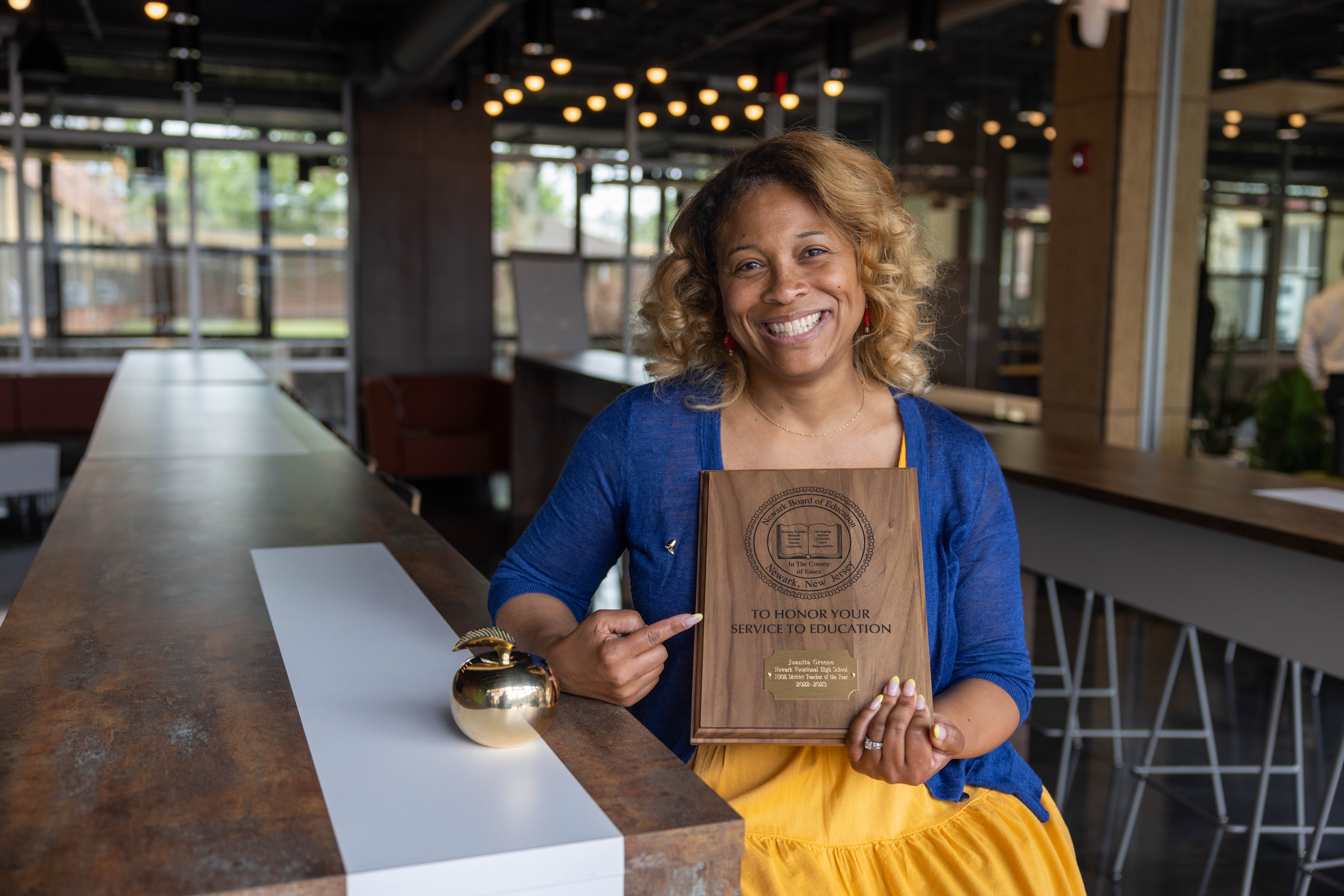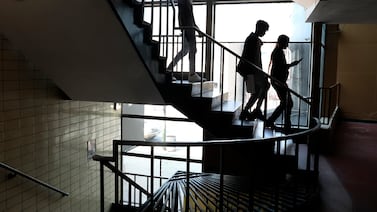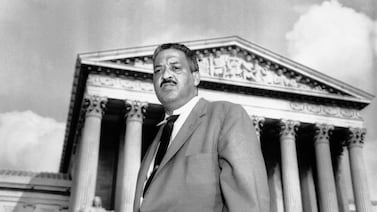Sign up for Chalkbeat’s free monthly newsletter How I Teach to get inspiration, news, and advice for — and from — educators.
Looking through an old scrapbook, Juanita Greene recently learned something new about herself.
The Newark Vocational High School math teacher rediscovered in those worn pages of a scrapbook she titled “School Days” that she wanted to become a teacher in first grade.
Greene, honored last month as the district’s 2023 Teacher of the Year, had forgotten all about her early career ambitions. But she does remember the moment in college when she made the life-altering decision to become a teacher.
“It wasn’t until I taught math during a summer program between my second and third years in college that I decided to change my major to mathematics and become a teacher,” Greene told Chalkbeat.
She would go on to dedicate 26 years (and counting) to teaching math.
Last month, Superintendent Roger León and other district officials showed up to her geometry class to surprise her with the announcement that she had been named Teacher of the Year.
Greene taught geometry to 10th graders and a probability and statistics class to seniors this past school year at Newark Vocational, where she just completed her fourth year.
Outside of teaching high schoolers, she’s also mentored teachers and taught graduate-level courses for students earning their master’s degrees.
As someone who felt ill-prepared for college, Greene aims to help her students feel secure and ready for their post-high school reality.
“I teach now so that I can better prepare students for life after high school,” she said. “I don’t want anyone to feel the way I did when I went to college.”
Greene spoke recently with Chalkbeat.
This interview has been lightly edited for length and clarity.
What’s your favorite lesson to teach and why?
There’s a lesson I do in geometry when I introduce two-column proofs that involves the card game UNO. That is a lot of fun. Proofs tend to be something new in geometry that students have never done before. By introducing proofs with something students know and enjoy, like UNO, they are more open to learning them.
How do you feel about being named Teacher of the Year?
It makes me so proud. It’s such an honor. I have dedicated so much of my life to teaching mathematics, and I work so hard. It’s great to be recognized after all these years for all the work that I do.
What’s something happening in the community that affects what goes on inside your classroom (or your school)?
I hate to be so general, but everything that happens in the community affects what goes on inside my classroom. We all bring our history, what we believe, what has happened to us or our loved ones with us to school every day. I try to be open and honest with my students, and I think they appreciate that I share so much of myself with them. As Rita Pierson said, “Kids can’t learn from teachers they don’t like.” I hope my openness allows students to like me and want to learn from me.
How do you approach news events in your classroom?
I like to check in with my students every day, especially after a challenging or interesting news event happens. It allows me to make sure they are feeling OK and learn a little about them as people. My check-ins have daily themes: Monday Motivation, Talk About It Tuesday, Would You Rather Wednesday, Think About It Thursday or Thoughtful Thursday.
Tell us about your own experience with school and how it affects your work today.
I enjoyed my high school experience, but I was very unprepared for college. I didn’t know how to study or advocate for myself. I didn’t have knowledge of books that most other students read, and I felt inadequate. I teach now so that I can better prepare students for life after high school. I don’t want anyone to feel the way I did when I went to college.
Tell us about the times when you shifted away from classroom teaching.
Throughout my years in education, I left teaching in my own class a few times. From 2006 through 2010, I worked as an educational consultant, where I led professional development workshops for teachers and worked with teachers in their own classrooms. From 2017 through 2019, I was an assistant professor of practice for Relay Graduate School of Education, where I taught pedagogy to teachers earning their master’s degrees. Both of these positions allowed me to work in schools and with teachers, but I missed working directly with students and being part of a school community. Also, I was teaching and learning new techniques and realized that I wanted to try them in my own classroom.
What are your summer plans? And what are you looking forward to in the 2023-24 school year?
This summer, I am enjoying time with my family and friends. I have a lot of fun concerts lined up that I’m excited to attend. I will also attend a couple of professional development workshops. For 2023-24, I am looking forward to our new geometry textbook and using more technology throughout the school year.
Catherine Carrera is the bureau chief for Chalkbeat Newark, covering the city’s K-12 schools with a focus on English language learners. Contact Catherine at ccarrera@chalkbeat.org.









